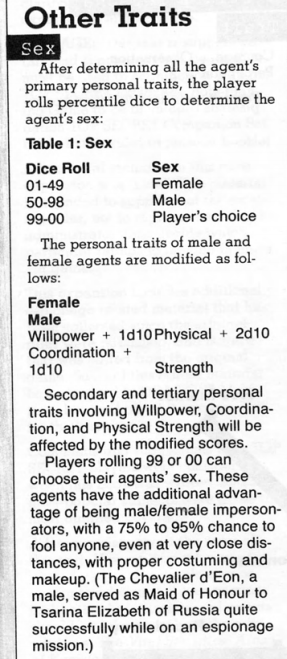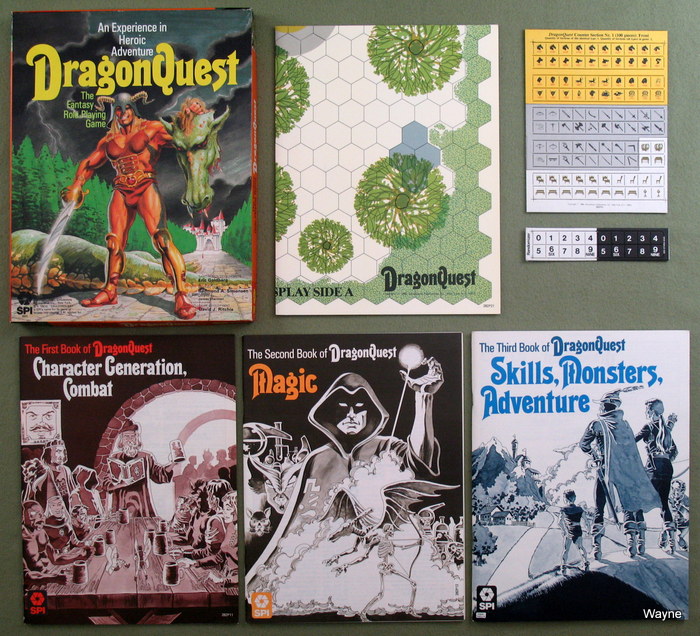
Top Secret was, to the best of my knowledge, the first dedicated espionage RPG. Others, notably the licensed James Bond 007 RPG, soon followed. Alas, neither the original Top Secret, nor the followup Top Secret S.I. are available for purchase in PDF at this time. However, there is a new version with radically different rules, recently published called Top Secret/New World Order.
My memories are that it was a fairly crunchy game for its time, and that it was a better commando action game than it was an espionage game… that last part may be more due to our style of play than the game itself.
Character generation starts with your primary personal traits: Physical Strength, Charm, Willpower, Courage, Knowledge, and Coordination. Stats are generated with 1d100, but there is a modifier chart to skew the results higher for player characters.
I roll 20, 35, 79, 41, 33, and 45. This gives the adjusted stats of:
Physical Strength 45, Charm 50, Willpower 84, Courage 56, Knowledge 48, & Coordination 60.
You then calculate your secondary personal traits, which are calculated from your primary traits, and all fractions round up. There are a number of these…
Offense is an average of Coordination + Courage, so 58.
Deceptions is an average of Courage + Charm, so 53.
Evasion is an average of Charm + Coordination, so 55.
Deactivation (of traps, etc.) is Knowledge + Coordination, so 54.
Life Level is Physical Strength + Willpower / 10, so 12.9 which rounds to 13.
Movement Value is Physical Strength + Willpower + Coordination, so 189. This is compared to a chart, and my Movement Value is Average.
Then there are your tertiary personal traits, which are calculated from both primary and/or secondary traits. These are:
Hand to Hand Combat Value is Evasion + Physical Strength, so 100.
Wrestling Combat Value is Offense + Physical Strength, so 103.
Surprise Value is Deception + Evasion, so 108.
Like a lot of games for its time, it very much assumed that many if not most details, such as height, age, handedness and whether you needed corrective eyewear, should be randomly determined. I’ve decided that my character is male, so after rolling I determine that I am 5′ 11″ tall, I am 31 years old, and I have normal vision. No corrective eyewear is required.

Interestingly, in the main rulebook it was assumed that the player could choose their sex, and that there were no stat differences between men and women… but the Top Secret Companion seems to have changed this. They added a random chart for sex, and an unreadable modification for stats that is unclear as to whether it’s meant to apply to men, women, or both. There are also random rolls for blood type and a number of other things. I consider the Companion to be optional, and won’t be using much from it.
The number of languages you can speak is based on your knowledge level, and your proficiency in each is randomly determined. Your primary language is 3d10+70, and any additional languages are straight percentile rolls, but must be lower than your native language. I decide that my character’s native language is English, and I choose Nepali as my second language. My English proficiency is 92, and my Nepali is a 91. I figure my nationality is British.
Now we move on to Areas of Knowledge. These are mostly useful for establishing or maintaining a cover. You have one or more superior areas of knowledge based on your Knowledge score, divided by 10 and rounded up… so I have 5. I get Metallurgy, Medicine, Law, and two ‘Player’s Choice’, so I pick Political Science, and World History/Current Affairs. Honestly, the random rolls don’t make a lot of sense, but okay…
My score in each are determined by percentile roll and adjusted by a table. My final scores in each are: Metallurgy 68, Medicine 105, Law 104, Political Science 129, World History 87. From the Companion, I choose Political Science for my education, and have a Bachelor of Political, Economic, and Social Sciences. I choose a cover occupation as a Diplomatic aide, which leverages my knowledge and education well and gives plenty of opportunities for travel.
Also pulling from the Companion, I decide I was in the military, specifically the Royal Navy. With my degree I enter the service as a Midshipman, and with one six year tour, I exit the service as a Lieutenant.
You then choose your Bureau classification, which is basically a character class (I choose Investigation) and then you spend money on personal effects. My starting funds are $4400. Gear for your mission is handled separately, and I’m not going to bother with gear. I will note that based on his background, he would be qualified with the Glock 17, and the SA80/L85 service rifle.
Name: Joseph O. Fraser
Codename: Gambit
Background: Mr. Fraser joined her Majesty’s Royal Navy as a Midshipman after graduation from university with honors. Assigned as liaison officer to the Queen’s Gurkha Signals due to strong language skills. Honorable discharge.
Sex: Male Age: 31 Nationality: Scottish (United Kingdom)
Height: 5′ 11 Weight: 170 lbs
Skin: White Hair: Brown Eyes: Brown
Military Service: Royal Navy, Lieutenant, ret. NROTC
Education: B.P.E.S.S., Cambridge University
Languages: English (92), Nepali (91)
Areas of Knowledge: Metallurgy (68), Medicine (105), Law (104), Political Science (129), World History/Current Affairs (87)
Bureau: Investigation
Experience: 0
PS: 45, Charm: 50, Will: 84, Courage: 56, Know: 48, Coord: 60
Offense: 58, Deception: 53, Evasion: 55, Deactivation: 54
Life Level: 13
Movement: Average
HtH CV: 100, Wrestling CV: 103, Surprise: 108
